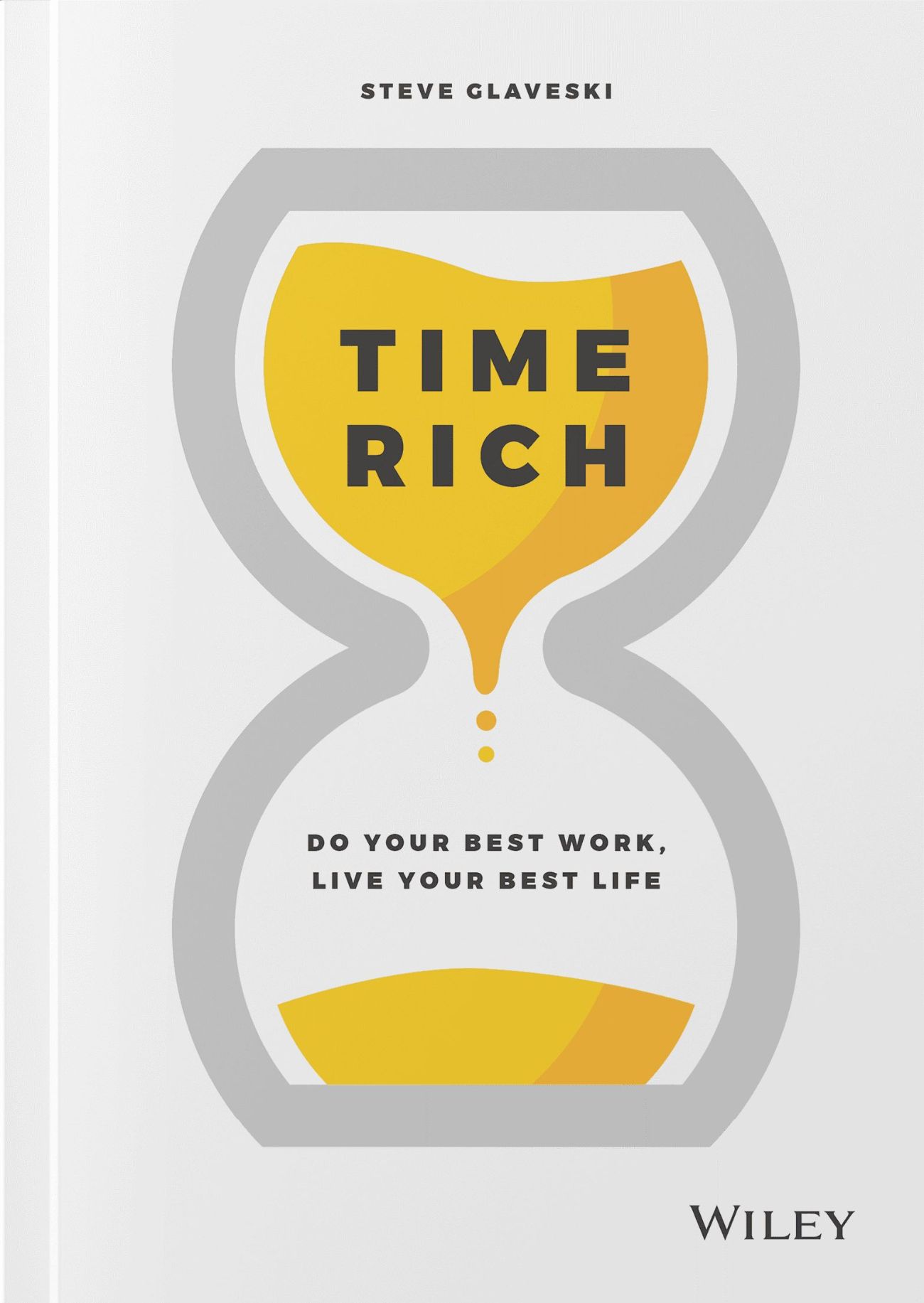Time Management: "Asynchronous Communication Becomes Key"

Steve, in your new book Time Rich: Do Your Best Work, Live Your Best Life you write about time management. Why should I spend time on another book about this topic?
A lot of books I have come across on this topic are focused on automation or outsourcing. I have tried to look at it from the perspective of organisations and the way teams are set up in start-up-cultures or in large corporations. Because, even if you are someone who wants to take control of your time chances are your work culture is one where you have to be hyper responsive to e-mails, to Slack messages, to meeting invites. Also, your culture might be one which is characterised by outsourcing accountability, so you cannot make decisions on your own. By virtue of all this, things slow down and the time investment required to get things done gets longer and longer.
You mentioned collaboration tools. Are these tools time killers?
Tools are only as good as how you use them. When the whole world went remote, tools like Zoom or Slack or Microsoft Teams became very popular very quickly for a lot of large corporations who had long ignored these technologies. Unfortunately, corporations oftentimes use these tools to replicate a lot of these bad habits that permeate the office: back-to-back meetings, one hour meetings with seven people around the table, people being interrupted 50 to 60 times a day. This is still occurring except it’s now via Zoom or Slack.
And these interruptions are time killers?
As knowledge workers, we do our best work when we can get in a flow state. But we cannot get in this state when we get interrupted 50 to 60 times a day. Most people are constantly in a state of hyper-responsiveness. If you happen to be in the flow state, it takes you about 23 minutes to get back into it after an interruption. But because there are so many permeating our days, we are lucky if we get 30 minutes in the flow state. This is a tragedy.

What is your definition of flow and what is your advice on how to get in the flow daily?
Flow is the optimal human condition. It happens when we are deeply immersed in an activity and the rest of the world seems to just fade away. In terms of getting into flow: Having some kind of time constraint helps - having a deadline, but also the work being important to you. You need the right resources. And perhaps the most important way to get into flow really is by building momentum. So, if I want to write a 1000-word article, I put away all my distractions. I make sure the phone isn’t right next to me, I close all the other tabs and just focus on, let’s say, 100 words of ordinary quality. Once I have 100 words, it is so much easier to just keep going than it was to start in the first place. And that comes back to Isaac Newton and his laws of motion which state that an object in motion stays in motion.
Let’s switch the perspective from employees to managers. What can they do to help their employees stay productive – without doing micromanagement?
They should identify what the blockers or the barriers to getting into flow are in the organisation. They need to look at things like delegations of authority or approval levels. In some companies, these approval levels can be very low, which means you need to seek sign-off for 500-dollar-investments. I think it is important that companies delineate between what Jeff Bezos calls Type 1 and Type 2 decisions. Type 1 being irreversible, highly consequential decisions, and Type 2 being reversible decisions that aren’t costly and typically teach us something when we fail. As organisations become bigger, they tend to treat all decisions as if they are Type 1 decisions and that just slows things down and kills innovation. Treating most decisions as what they are, Type 2, helps us empower people to make decisions, learn from their mistakes, and move forward.
Managers should also reflect on how people waste their time. Is it that we set our meetings one hour by default? Is it that we invite seven people to our meeting when really we just need two people at that meeting? Or is it that we expect a response within thirty minutes? Identifying these things and then communicating what the alternative is, is critical.
Time management is not about cutting out face-to-face-communication.
How can managers ensure a good team dynamic when teams can´t see each other and people shouldn’t interrupt each other for a chat?
I think time management is not about cutting out face-to-face-communication - whether it is online or in the real world - but having a batched time for those interactions. For example, at our company, you can block time in your calendar for high focus work and if someone wants to request a meeting, it cannot take place during that time. Our days are not packed with meetings and at the same time the people get the feeling that their time is respected and cannot just get taken away from them.
In terms of team dynamic: With my team we touch base three times a week. We have a fifteen-minute Zoom call and that is an opportunity to connect. We also do other things like Zoom lunches. But I think if you have a company that has a worthwhile mission, if you have capable and competent people on the bus who want to contribute, and if you give them the right tools, that shared mission is a form of bonding itself. To me, working together on something worthwhile is the best way of bonding.
Even if a company wants to change the way people treat their time, fact is most companies pay and promote their employees for the time they spend in the office not for the amount of work they do or the outcome of their work. Shouldn’t we discuss new ways of pay instead of new ways on how to be productive?
Yes definitely. Payment by the hour is still a throwback to the time of the Industrial Revolution. On an assembly line, in a coal mine or on a farm, the more hours you spent doing something the more output you got. But when we are doing knowledge work, we can only get in that deep state of work for about four hours a day. So, to be counting hours doesn’t really make sense. We should ultimately be looking at what people are creating, contributing, and what outcomes they are delivering to the organisations rather than the hours they are spending. And this is something that asynchronous organisations really support.
I do not need to be online when a message is sent, I just need to receive it in a timely manner and take appropriate action.
Now, with the move to remote work, organisations get the opportunity to step out of that industrial revolution type of thinking where we conflate output with hours and presence in the office with productivity, to one where people do not need to be online at the same time. And this creates an environment where asynchronous communication becomes key. I do not need to be online when that message is sent, I just need to receive it in a timely manner and take appropriate action. With the move to asynchronous communication, people get to design their days and weeks as it suits them - as long as they are continuing to provide the bare minimum amount of communication that is required to deliver the outcomes. Consider it a firm of minimum viable communication.

Do people get paid per hour at your company?
When we started Collective Campus five years ago and hired people, we had a 37,5-hour-work-week. We have moved away from that. We basically say: These are the hours that we tend to be online, we will allocate goals and for us it is not about where you are, it is not about how many hours you put in, it is about outcomes. What we find is, once new people are on board for say four weeks to eight weeks, they tend to get into a rhythm as to how much work is required. But that ultimately requires taking a step back: We look at the our goals and the time frame needed and then we define the rhythm that is required to get there. If we see that people are spending more than six hours a day on actual work, that is a trigger and we have to see if we need to get another person on board to support the team. Because I don’t want people to work eight, nine, ten hours days. People who sit in the office for ten hours a day are not really working. I would rather have two employees working five hours a day than one working ten hours a day.
A lot of people argue that their job isn’t one which could be done in less than at least eight hours a day. Have you heard this argument? What is your response?
When I published an article for HBR called “The Case for the 6-Hour-Workday” I shared it on LinkedIn and one of the comments I received was “Well that sounds great in theory but I could never get all my work done in six hours”. I think that is where the Pareto Principle or the 80-20-principle comes into play. Not all of our tasks are created equal. Chances are you have three tasks out of ten that are far more valuable than the others. And these are the tasks you should really focus on. If you get to task number four or five then that is a bonus. The rudimentary tasks that people find themselves doing should nowadays be automated or outsourced at the very least.
And the other part of that equation is, if managers are putting unreasonable expectations on people and giving them all sorts of rudimentary work or fifteen tasks a day, that speaks volumes about the toxic management culture that exists in some organisations, and why up to eight percent of healthcare costs in the United States, for example, are attributable to workplace stress. So again, time management comes back to these two things: Your personal accountability and with respect to on how you spend your own time, and the culture that is created and supported by the management.
About the autor
Steve Glaveski is the CEO of Collective Campus, a corporate innovation accelerator, which is located in Melbourne, Australia. Steve Glaveski hosts the Future Squared podcast and is author of the book " Employee to Entrepreneur".


